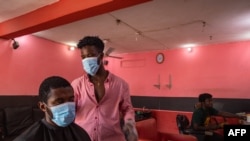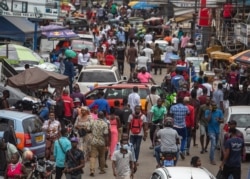Ghana this week lifted a three-week partial lockdown in its capital, Accra, allowing businesses to reopen, including hair salons and barbershops. Critics, who say it's too soon to relax the restrictions, point out social distancing is impossible when someone is cutting your hair. Some Ghanaians, though, who during the lockdown lamented the scruffy state of their hair in social media posts, and even tried to get home services despite the risks, are rushing to salons to regain their style.
In Ghana, salons and barbershops are "social pillars" and play a big part in the economy, according to Kuorkor Ayisa, owner of natural hair salon Twists and Locs Salon.
Across Ghana, services can come from streetside barbers in converted shipping containers, to lavish, well-equipped salons. Ayisa said the hair business provides a way for many to support themselves, especially those without much formal education.
She closed both her salon locations before the lockdown announcement to protect her staff and clients, but when the lockdown ended, she was inundated with inquiries about their reopening.
Ayisa is following government calls to enforce strong hygiene and social-distancing measures. Her spacious salons can keep clients well-separated, and she has put measures in place, including frequent cleaning of surfaces, and requiring face masks.
While the stylists are not able to maintain distance from their clients, she is confident her salons are doing their part to keep people safe, but clients must comply with their measures, and her stylists can turn uncooperative customers away.
"If someone refuses to adhere to the protocols -- if someone is coughing and comes in and is not going to wear a face mask -- they would respectfully, politely indicate to the client we will not be able to serve them. That point really has to be understood by the client, if it isn't, it's not something we are willing to compromise on, because this is an issue of life and death," said Ayisa.
People also have been trooping into Kingsmen Barbers since it reopened after the lockdown lifted.
Owner Selorm Klutse said the three-week closure was hard on the business -- his staff and clients.
He had people contacting him during the lockdown, looking for home services.
"They called on the phone to ask if we are working, if we are going to offer home services, the thing is we couldn't have offered home services because the lockdown was enforced by the law enforcement agencies, so it wasn't possible. We had to obey the law," said Klutse.
Since reopening Monday, he has also tried to institute a range of health and safety measures, including spacing clients, and high hygiene standards for customers and barbers.
Public health expert Nana Kofi Quakyi from the New York University's School of Global Public Health has been back home in Ghana during the lockdown period.
Quakyi was surprised when Ghana lifted the lockdown because of his concerns about testing and tracing. He also questioned whether there was enough analysis of the impact of the lockdown before it was lifted.
He said that although desire for haircuts was understandable, there was still a risk of local transmission, especially given the impossibility of maintaining social distancing.
However, with the government indicating a lower risk now, it was unfair to blame businesses for wanting to reopen, he said.
Lifting the lockdown was in part aimed at allowing the economy to start moving, especially because many had suffered significant losses under it, he said.
"People in the informal sector, those entrepreneurs working in barbershops and salons who survive on the daily wages, and who survive on the daily hustle, could resume some economic activity, so they could literally put food on the table and feed themselves and feed their families. So if you take for granted the government's view on the question of there being a lowered risk, then it's difficult to make a case for why they wouldn't be able to be open, if other sectors of the economy are allowed to be open," he said.
Quakyi, who used to frequent a barber before the pandemic, says he is now, like many around the world, looking up YouTube videos for some DIY (Do It Yourself) inspiration.












